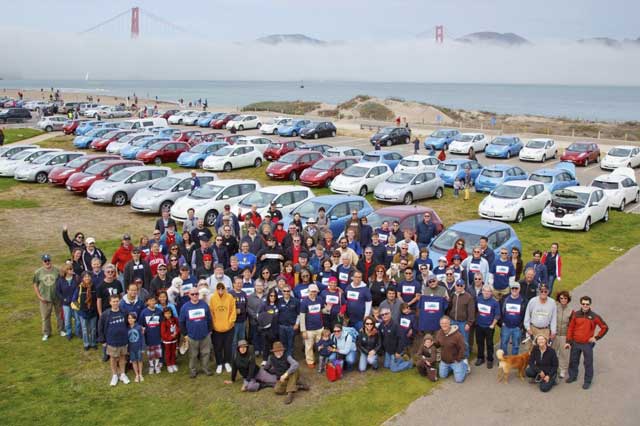Transportation is the largest source of carbon pollution in the U.S., producing 40 percent of our climate-disrupting greenhouse gases. One way to combat the climate crisis is to replace the vehicles that run on dirty fossil fuels with clean vehicles that give off no exhaust -- and not just the cars we drive, but also the school buses our children ride on, the transit buses we take to work, the cars we share and ride-hail, the vehicles our government fleets deploy, and even the vehicles we operate while on the job.
National Drive Electric Week gives people the chance to experience how fun it is to drive an electric vehicle and learn how it's more affordable than ever to kick gas and join the clean car revolution. Taking place from September 8 -16, thousands of people across the U.S. will celebrate clean transportation with their neighbors and community leaders in efforts to protect our climate, dismantle the oil industry, and #Resist Trump's rollback of environmental protections. Presented at the national level by the Sierra Club, Plug In America, and the Electric Auto Association, as well as allied groups and volunteers putting on the hundreds of individual events, National Drive Electric Weekis in its eighth year and has grown dramatically since its inception.
More than 320 events are registered throughout the country, giving communities a chance to see and test drive many of the more than 50 plug-in hybrid or full-battery electric vehicles on the market today. Many events also display the zero-emission transit buses, school buses, trucks, government fleet vehicles, motorcycles, scooters, and more that will help us fight back against climate change.
Creating a Culture of Sustainable, Equitable Mobility
“The push toward zero emissions and electric vehicles is more than individual preference and personal vehicles, but building a culture and movement toward sustainable transportation,” says Carlo De La Cruz, senior campaign representative of the Sierra Club’s My Generation campaign. Recently, the Sierra Club and allies successfully campaigned for L.A. Metro to commit to a 100% zero emission bus fleet by 2030.
Geoffrey Schmidt of Greeley, Colorado, owns a food-waste composting business that uses EVs for residential curbside collection. “EVs are well-suited for hauling loads with a trailer because of abundant torque and excellent stopping power due to the regenerative brakes,” he says.
One of the most celebrated events during Drive Electric Week is in Watts, California. In East Los Angeles, Watts has one of the highest levels of air pollution in the U.S. With the federal attacks by the Trump administration on federal vehicle-efficiency standards and the weakening of carbon-reduction rules for power plants, Southern California air pollution will only get worse unless we accelerate the switch to zero-emission transportation. The Watts event emphasizes the state and local programs available for low-income communities, and draws large crowds every year. At this year’s event, they are announcing newly installed charging stations in their neighborhood.
Chip Sharpe of Bayside, California, says he drove 8,200 miles from California to North Carolina on a tour of civil rights sites and memorials in Selma, Montgomery, Birmingham, Atlanta, and Greensboro. “I spent not one penny on electricity,” he boasts, thanks to the charging stations he found along the way.
Electric vehicles are finally getting close to hitting the mainstream, thanks to more people seeing them on the road, gaining access to test drives, and learning of the rebates and incentives available to buy and lease them. Almost 200,000 EVs sold in the U.S. this year, an increase of 56 percent compared with this time last year. And automakers are taking notice of rising public interest. Nissan announced plans to sell one million EVs a year by 2022, and Volkswagen will launch an all-electric car-sharing program to hit North America in 2020.
Say Goodbye to Range Anxiety
Range is one of the most discussed aspects of electric vehicles, especially for new buyers. The U.S. Department of Energy claims about 60 percent of all U.S. car trips in 2017 were under six miles, but drivers want the freedom of worry-free long-distance road trips -- and EVs provide that. Today, there are numerous plug-in cars that go 150 - 300 or so miles on a single charge, and more are on the way, including those with a range of more than 600 miles..
Mark and Janet Threw of Loomis, California, went over 2,000 miles on the dealer's first free tank of gas with their plug-in hybrid Volt; and Daniel Millis from Tucson, Arizona, says he can drive his plug-in hybrid around town almost indefinitely without buying any gas. “Immediately after buying it, we strapped a canoe to the roof and drove hundreds of miles for a river trip!”
Join the Clean Vehicle REVolution. RSVP to an Event Near You!
The many community events organized during National Drive Electric Week are going to be exciting -- a San Francisco event coincides with the Global Climate Action Summit and is the only electric vehicle ride-and-drive event among the hundreds of climate events in the city that week. The event in Steilacoom, Washington, will have over 22 public officials participating, and Lyft will be making an announcement at the Atlanta event.
To see for yourself why EVs are the future of transportation, check out the National Drive Electric Week website and RSVP to attend an event near you.
The Los Angeles Electric Bus Coalition, photo courtesy of Carlo De La Cruz
Dolores Varga’s Tesla was a retirement gift to herself, and she considers her choice to drive electric one way for her to #Resist the current administration’s lack of environmental support. It has taken her cross country many times, and it’s so quiet that when she is in national and state parks, she comes across more wildlife.
Dan Millis’s plug-in hybrid does everything. “It only burns gas in a pinch or on road trips. I took this photo of Khaled, Marvin, and Alex with my C-Max Energi after a mountain bike ride in Tucson, Arizona.”
